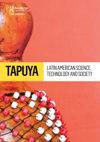一个幽灵正在困扰着科学,海盗的幽灵。关于阿根廷研究人员使用非法途径获取科学文献的案例研究
IF 1.2
Q2 HISTORY & PHILOSOPHY OF SCIENCE
Tapuya: Latin American Science, Technology and Society
Pub Date : 2022-11-03
DOI:10.1080/25729861.2022.2117491
引用次数: 0
摘要
本研究的目的是调查阿根廷科研人员获取科学文献的不同类型。本文特别关注非法途径被诉诸的程度、诉诸的动机、合法性和道德可接受性的表征,以及生产率与不同获取途径之间的关系。为了解决这些问题,在CONICET研究人员中进行了一项调查。主要研究结果如下:非法路线的使用是大规模和广泛的;它不会取代合法途径的使用,而是与之共存;在合法性和道德的表述之间存在着明显的脱节,使用非法途径的动机既是实际的,也是价值论的。本文章由计算机程序翻译,如有差异,请以英文原文为准。
A specter is haunting science, the specter of piracy. A case study on the use of illegal routes of access to scientific literature by Argentinean researchers
ABSTRACT The aim of this study is to investigate the different types of access to scientific literature used by Argentinean researchers. This paper focuses particularly on the extent to which the illegal route is resorted to, the motivations for resorting to it, representations of legality and moral acceptability, and the relationship between productivity and different access routes. In order to tackle these topics, a survey was carried out among CONICET researchers. The main findings are as follows. The use of the illegal route is massive and widespread; it does not replace but rather coexists with the use of legal routes; there is a striking disconnection between the representations of legality and morality, and the motivations for using the illegal route are both practical and axiological.
求助全文
通过发布文献求助,成功后即可免费获取论文全文。
去求助
来源期刊

Tapuya: Latin American Science, Technology and Society
Social Sciences-Social Sciences (all)
CiteScore
1.60
自引率
0.00%
发文量
39
审稿时长
19 weeks
 求助内容:
求助内容: 应助结果提醒方式:
应助结果提醒方式:


